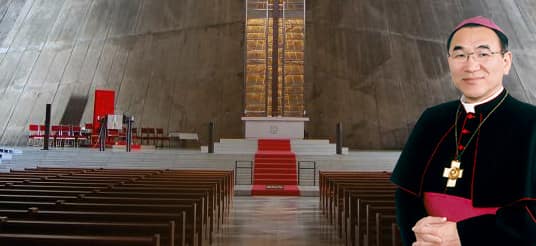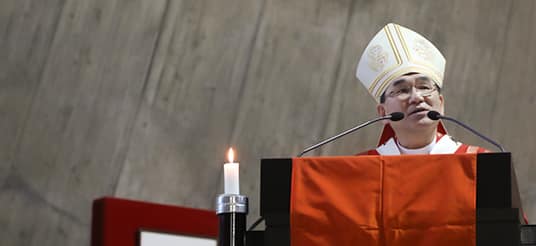Archdiocese of Tokyo

Sermon for Confirmation and First Holy Communion
May 13, 2012 Sixth Sunday of the Easter Season
Franciscan Chapel Center, Roppongi
First Reading: Acts 10:25~26. 34~35. 44~48
Second Reading: 1 John 4:7~10
Gospel: John 15:9~17
Today is the Sixth Sunday of the Easter Season. During Mass the sacrament of confirmation will be given, and first holy communion will take place.
The sacraments of baptism, confirmation and eucharist together are called the “sacraments of initiation”. They are all the work of the same Jesus Christ, and give the grace of the same Jesus Christ.
Baptism makes us share in the death and resurrection of Jesus. We die with him, and with him we become sharers in his resurrected life. We are able to have all our sins forgiven, and to be born as God’s children.
Confirmation makes us take part in the gifts of Pentecost, the coming down of the Holy Spirit, and it gives us, as members of the Church, a mission to proclaim God’s love in a powerful way.
The eucharist is the sacrament by which we receive the body and blood of Jesus in the form of bread and wine, so that we become one body with him and are more deeply united to him.
So now, let’s try to get a feel for the words that Jesus speaks in the gospel today. He said, “This is my commandment: love one another, as I love you. No one has greater love than this, to lay down one’s life for one’s friend.” (John 15:12-13)
Everyone knows that Christianity is a religion of love, and that the center of Jesus Christ’s teaching is love.
The evangelizers, the missionaries, who gave Christianity to Japan in what we call the “Christian Era”, were puzzled, at a loss about what Japanese word to use for this “Christian love”.
The original Greek word that the bible uses to tell about this love is “agape”. The Japanese bible today uses “ai” for “agape”. Even though it means many different kinds of love, it also means the special love of “agape”. But the missionaries of four hundred years ago did not want to use the word “ai”, because at that time it meant something bad. It described the heart of a person who tries to fulfill his selfish desires.
In the end, the Bateren, as priests were called in those days, decided to use “go-taisetsu” for “love”, and “taisetsu ni suru” for “to love”. The meaning is: “to care about deeply”. This is a splendid translation which people understand even today.
Jesus said, “Love one another as I love you.”
“To love” means to live as Jesus did.
Jesus’ love is a love that forgives enemies, and forgives sins.
When Jesus was crucified, Peter and the other disciples were overcome with fear. They betrayed Jesus, they abandoned him and went away. When Jesus rose from the dead, he appeared to the disciples. He forgave them, and gave them the power to tell people that their sins are forgiven.
Also, Jesus taught that we should forgive our enemies, and on the cross he himself prayed to God for the people who were persecuting him: “Father, forgive them, they know not what they do.” (Luke 23:34)
The love of Jesus: by that we mean he forgives the sins of every person, he accepts each person with their faults, he enables them to be reborn as new persons, he gives people courage and hope for living
The love of God: this is God’s power, that makes people able to live as God’s children, and leads them along that way.
Now, all of you who will be confirmed today, and receive the body of Jesus for the first time, I want you to not forget. You will receive the gifts of the Holy Spirit, you will be given the body of the Lord, you will be joined to the Lord Jesus more deeply, you will become a person who actually lives out Christ’s love.
If you live the love of Christ, “caring deeply about others,” the people of Japan who see you doing so, will recognize that the God of love exists, and they will surely get to desire to become disciples of Christ.
Let us pray for the gift of the Holy Spirit, that each one of us be given the grace to know more deeply the love of God and the love of Jesus Christ.





